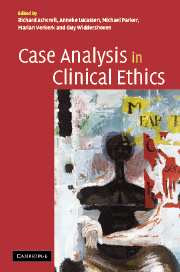Book contents
- Frontmatter
- Contents
- Notes on contributors
- Acknowledgements
- 1 Philosophical introduction: case analysis in clinical ethics
- 2 Families and genetic testing: the case of Jane and Phyllis
- 3 Family access to shared genetic information: an analysis of the narrative
- 4 A virtue-ethics approach
- 5 Interpretation and dialogue in hermeneutic ethics
- 6 ‘Power, corruption and lies’: ethics and power
- 7 Reading the genes
- 8 A utilitarian approach
- 9 A feminist care-ethics approach to genetics
- 10 A conversational approach to the ethics of genetic testing
- 11 Families and genetic testing: the case of Jane and Phyllis from a four-principles perspective
- 12 A phenomenological approach to bioethics
- 13 An empirical approach
- 14 Response to ethical dissections of the case
- 15 Philosophical reflections
- Index
- References
15 - Philosophical reflections
Published online by Cambridge University Press: 01 September 2009
- Frontmatter
- Contents
- Notes on contributors
- Acknowledgements
- 1 Philosophical introduction: case analysis in clinical ethics
- 2 Families and genetic testing: the case of Jane and Phyllis
- 3 Family access to shared genetic information: an analysis of the narrative
- 4 A virtue-ethics approach
- 5 Interpretation and dialogue in hermeneutic ethics
- 6 ‘Power, corruption and lies’: ethics and power
- 7 Reading the genes
- 8 A utilitarian approach
- 9 A feminist care-ethics approach to genetics
- 10 A conversational approach to the ethics of genetic testing
- 11 Families and genetic testing: the case of Jane and Phyllis from a four-principles perspective
- 12 A phenomenological approach to bioethics
- 13 An empirical approach
- 14 Response to ethical dissections of the case
- 15 Philosophical reflections
- Index
- References
Summary
In the centre of Fedora, that grey stone metropolis, stands a metal building with a crystal globe in every room. Looking into each globe, you see a blue city, a model of a different Fedora. These are the forms the city could have taken if, for one reason or another, it had not become what we see today. In every age someone, looking at Fedora as it was, imagined a way of making it the ideal city, but while he constructed his miniature model, Fedora was already no longer the same as before, and what had until yesterday a possible future became only a toy in a glass globe.
(Calvino 1972).Much writing and thinking in bioethics takes the form of a kind of Calvinesque speculative architecture. Our aim in this book and in the particular way in which it has been created has been to do something different. We wanted, in particular, to encourage the contributors to engage with one another and with the case to a degree unusual in bioethics practice. Behind this intention is something like a commitment to the idea that moral development, the growth of moral understanding and the emergence of moral practice in medicine (and in bioethics) can be facilitated by encouraging moral philosophers and health professionals to engage with one another in a focused and reasonably structured setting. More broadly it is to argue that conversation is a developmental fundamental of human experience (Parker 1995).
- Type
- Chapter
- Information
- Case Analysis in Clinical Ethics , pp. 225 - 230Publisher: Cambridge University PressPrint publication year: 2005



